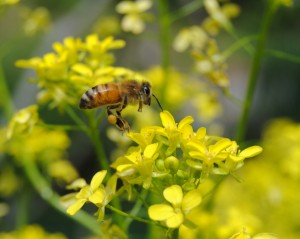13
Apr
Lowe’s Commits to Phasing Out Neonic Pesticides, Moving Towards More Organics
(Beyond Pesticides, April 13, 2015) Last week home and garden retailer Lowe’s announced its commitment to phasing out the sale of products containing neonicotinoid (neonic) pesticides within 48 months. The announcement is encouraging for consumers and environmental groups, as it comes after nearly two years of direct action urging the retailer to remove bee-toxic insecticides from store shelves. A 2014 report released by Friends of the Earth, Beyond Pesticides and allies found that over half of garden plant samples purchased at major retailers like Lowe’s and Home Depot contained neonic pesticides, which when applied makes the entire plant poisonous to bees and other wild pollinators. Neonics have been consistently implicated in the decline of honey bees and other wild pollinators.
Lowe’s commitment to phasing out neonics is being combined with a promise by the company to include greater organic product selection in its stores, encourage growers to use biological control programs, and educate employees and consumers through brochures, fact sheets, and product labels. Lowe’s now joins BJ’s Wholesale Club, Home Depot, and a number of plant nurseries in committing to transition away from the use of bee-toxic pesticides. The elimination of neonicotinoid pesticides on store shelves and in plants promoted as pollinator friendly will go a long way helping residents create truly safe pollinator habitat in their backyard and neighborhoods.
 However, holdouts remain within the nursery industry. Although the White House Council on Environmental Quality released new guidelines requiring federal agencies forgo planting neonic-treated seeds or plants when adding pollinator friendly habitat to federal facilities or federal lands, AmericanHort and the Society of American florists criticized the recommendations, calling them “largely unachievable.” But while these two national industry groups charge that creating pollinator habitat without toxic inputs cannot be done to protect pollinators, several smaller nurseries and retail outlets have already pledged to not use systemic neonicotinoids to grow their plants and protect pollinators. Focused on their owe operations, Behnke Nurseries Co. in Maryland has issued a policy statement to their stores that prohibits the application of neonicotinoids to its plants and recommends using least-toxic alternatives. Bachman’s 21 locations in Minnesota are eliminating neonicotinoids on their nursery stock and outdoor plants. Taking it to the next level, Bachman’s is also working with suppliers to discontinue the use of neonicotinoids. Cavano’s Perennials, MD, Blooming Nursery, OR, North Creek Nurseries, PA, Suncrest Nurseries Inc, CA, Desert Canyon Farm, CO, and others have either discontinued or never used neonicotinoid pesticides in their nursery operations
However, holdouts remain within the nursery industry. Although the White House Council on Environmental Quality released new guidelines requiring federal agencies forgo planting neonic-treated seeds or plants when adding pollinator friendly habitat to federal facilities or federal lands, AmericanHort and the Society of American florists criticized the recommendations, calling them “largely unachievable.” But while these two national industry groups charge that creating pollinator habitat without toxic inputs cannot be done to protect pollinators, several smaller nurseries and retail outlets have already pledged to not use systemic neonicotinoids to grow their plants and protect pollinators. Focused on their owe operations, Behnke Nurseries Co. in Maryland has issued a policy statement to their stores that prohibits the application of neonicotinoids to its plants and recommends using least-toxic alternatives. Bachman’s 21 locations in Minnesota are eliminating neonicotinoids on their nursery stock and outdoor plants. Taking it to the next level, Bachman’s is also working with suppliers to discontinue the use of neonicotinoids. Cavano’s Perennials, MD, Blooming Nursery, OR, North Creek Nurseries, PA, Suncrest Nurseries Inc, CA, Desert Canyon Farm, CO, and others have either discontinued or never used neonicotinoid pesticides in their nursery operations
Beyond Pesticides also has a comprehensive directory of companies and organizations that sell organic seeds and plants. Included in this directory are seeds for vegetables, flowers, and herbs, as well as live plants and seedlings.
A large and growing body of scientific evidence continues to point to neonic pesticides has having substantial impacts not only on honey bees, but on numerous other native pollinators and birds. Last week a new report from the European Academies Science Advisory Council determined that “[T]here is more and more evidence that widespread use of neonicotinoids has severe effects on a range of organisms that provide ecosystem services like pollination and natural pest control, as well as on biodiversity.” In the United States, the U.S. Environmental Protection Agency announced a small step towards pollinator health by placing a moratorium on any new uses of neonicotinoid pesticides. However, the beekeeper and environmental groups have roundly asserted that this action falls short of the comprehensive approach that is needed to reverse pollinator declines.
As the White House Pollinator Task Force plan is expected imminently, changes from retailers like Lowe’s highlights that there are ways to avoid the use of these toxic products and move towards organic alternatives, if the impetus is there. Certainly concerned residents in the U.S. will continue to fight to protect the health of pollinators as well as themselves from the impacts of toxic pesticides. Over 1 million people delivered their signatures to Lowe’s asking the company to stop selling bee-toxic products. And over 4 million people urged the President to protect bees from neonic pesticides. According to a new poll, over half (56%) of folks in the U.S. consider declining pollinator populations a serious problem. Hopefully the Obama Administration will understand the will of the American people, that swift, overarching action and meaningful action protecting bees from pesticides is needed now.
Source: Friends of the Earth, Lowe’s Social Responsibility Report
All unattributed positions and opinions in this piece are those of Beyond Pesticides.











Hello,
I am interested in buying flower seeds that will attract humming birds, bees and butterflies…but want to make sure they are safe from neonicotinoids. Where can I get them…I don’t to wait till next year when Lowes starts selling them..
thanks
John Tobin
April 14th, 2015 at 1:43 pm